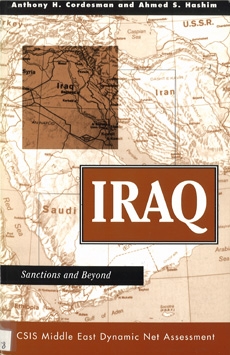|
INTRODUCTION
Iraq's current regime presents unambiguous security threats to the other states of the Gulf and to the West. While Iran's regime may offer some hope for constructive engagement, Iraq is virtually certain to be a revanchist and aggressive state as long as Saddam Hussein is in power. Even if Saddam and his coterie should fall from power, their immediate successor will most likely consist of another Sunni authoritarian elite, made up of other members of the Ba'ath party, senior military officers, or a combination of both.
It may well be a decade before any political transformation occurs in Iraq that produces a stable, moderate government. In the interim, Iraq may go through several short-lived regimes and even civil war. Its politics are likely to remain the politics of violence, many of its future leaders are likely to seek revenge for the Gulf War and its after-math, and its political elites are likely to reassert Iraq's search for hegemony in the Gulf and seek to become the leading regional military power.
This does not mean that Iraq cannot change, and should not be encouraged to change. It does not mean that sanctions and isolation are the only way of dealing with Iraq, or that Iraq's people should be punished indefinitely for the actions of its leaders. It does mean, however, that the Gulf and the West must be realistic in shaping their policy towards Iraq, and must have a realistic understanding of its current regime and military potential.
The Policy Options for Dealing with Iraq
The West and the other states in the Gulf must find ways to live with Iraq, seek to moderate the conduct of its regime, and create a climate for positive political change. The basic issue for policy is how this can best be done. There are several major policy options that the West, other
Gulf states, and other nations can pursue:
- Lifting political and economic sanctions under conditions that leave Saddam Hussein and the Ba'ath elite in power, and which effectively recognize that Iraq will not fully comply with the terms of the UN cease-fire.
- Continuing the present UN sanctions that isolate Iraq politically and cripple its economy, in order to force Saddam Hussein from power and to create a successor regime that will be less aggressive and willing to trade changes in the regime's behavior for a lifting of sanctions;
- Lifting all or most political and economic sanctions in return for a large degree of Iraqi compliance with the terms of the UN cease-fire, requiring full Iraqi compliance in providing reparations and the recognition by Iraq of its new borders with a sovereign Kuwait, but leaving Saddam Hussein and the present regime in power;
- A step-by-step lifting of political and economic sanctions under conditions which trade specific changes in the conduct of Iraq's regime for each step in reducing the present sanctions, while leaving Saddam Hussein and the present Ba'ath and military elite in power;
- Seeking to create an alternative "centrist" regime that is still based on the Ba'ath, Sunni elites, and/or the military, but drives Saddam Hussein and his coterie from power by maintaining a mix of sanctions, using other economic and political pressures, using covert action, and persuading neighboring states like Turkey and Jordan to support such a "peripheral strategy";
- Adopting a "peripheral" strategy that combines sanctions with covert action, which attempts to mobilize the Kurds and Shi'ites against the central regime, and which seeks to persuade neighboring states like Turkey and Jordan to support such a "peripheral strategy" and;
- Pursuing an individual national policy towards Iraq that seeks to maximize political and/or trade benefits in dealing with Iraq, regardless of the character of its regime and its conduct towards other states.
The UN is still committed to a policy of sanctions, but it is clear that there no longer is such a degree of international unity in pursuing this policy.
- Some states—such as Kuwait, Saudi Arabia, Britain and the US—continue to favor a hard-line approach because they believe it is impossible to deal with Saddam Hussein's regime. Even Kuwait and Saudi Arabia, however, did not fully support the US during the Kurdish crisis of August-September, 1996.
- Other states, including major outside powers like France and Russia, believe that sanctions now harm Iraq's people without offering any …
| 